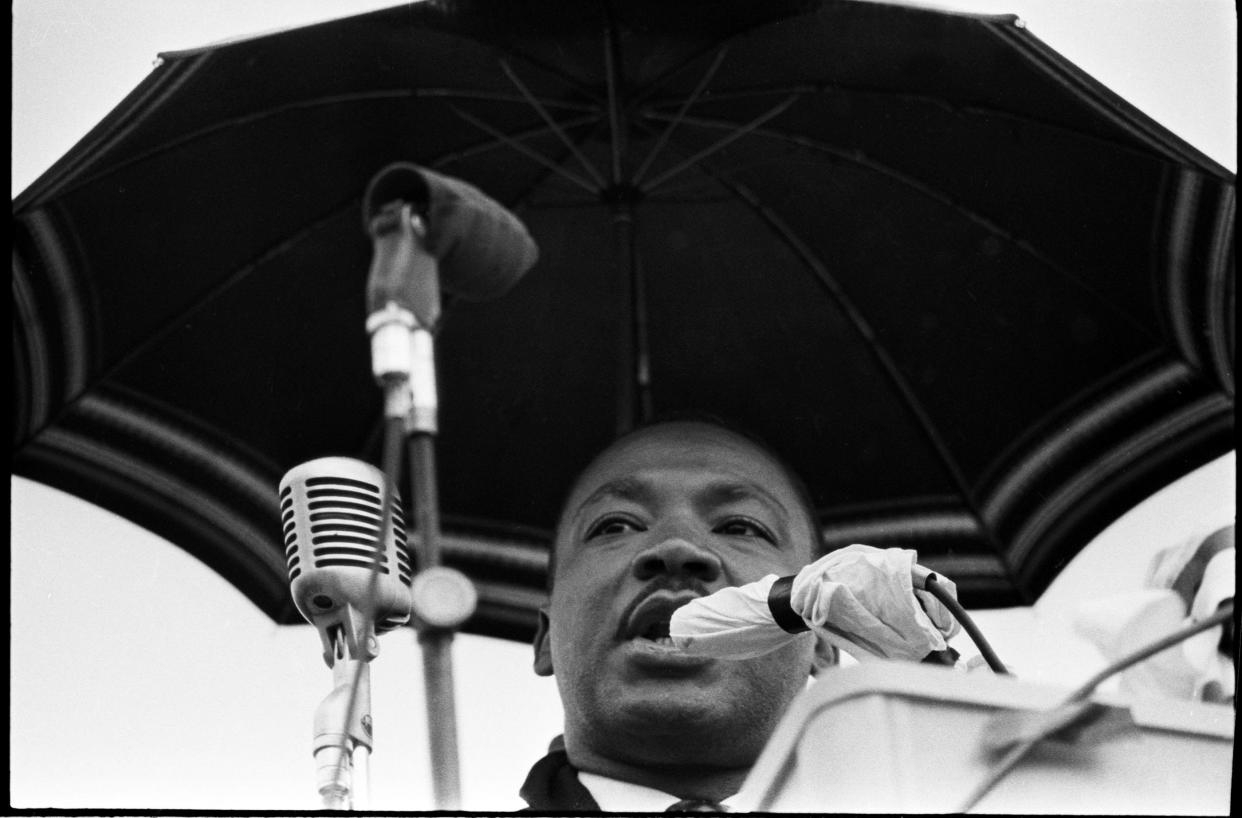Opinion: Kentucky businesses should honor MLK by stepping up to address racial disparities

- Oops!Something went wrong.Please try again later.
In 1963, the Reverend Dr. Martin Luther King, Jr. penned his famous Letter from Birmingham Jail. In it, he wrote: “We must come to see that human progress never rolls in on wheels of inevitability. It comes through tireless efforts and persistent work... and without this hard work, time itself becomes an ally of the forces of social stagnation.”
As we enter a new year and recognize the legacies of Dr. King and other civil rights leaders, it’s both inspiring and disheartening to realize that only 58 years have passed since MLK wrote these words.
Of course, life in 2022 is a sharp contrast to that in 1963 — and we’ve certainly made a great deal of progress in the years that have passed — but inequality does persist today. We continue to live with deep-seated disparities in education, economic outcomes and criminal justice that are hurting our people and our society, and we cannot afford to ignore them or put them aside.
More: Here are 5 events and ways to help you celebrate MLK Day in Louisville
However, despite these challenges, we continue to persevere and keep hope alive — and for good reason! Unlike the social climate of 1963, we are living in an era where the very cornerstones of society, like the business community, are stepping up to become agents of change.
When racial unrest swept across our state and the nation in the summer of 2020, Kentucky Chamber leaders convened to discuss how the business community could become a more active part of the solution.
Stakeholders in business, education and the public sector came together to form the Task Force on Racial Inequality, which published its first-ever Equity Report in January 2021. To put the report’s findings into action, the Kentucky Chamber Foundation launched the Center for Diversity, Equity & Inclusion at the end of last year.
With the Center for DE&I, the Chamber is building upon its long history advocating for social justice through initiatives like the Kentucky Comeback campaign, Center for Workforce Development, Bus to Business program, ID program for previously incarcerated individuals and legislative work increasing thresholds for certain felony offenses.
The Center for Diversity, Equity and Inclusion will help us take this work to the next level as we lead statewide efforts to advance inclusive business practices and equity in education. This is desperately needed, as the state’s 2015 Kindergarten Readiness Screener showed that only 44.5% of Black students were prepared for kindergarten, compared to 52.7% of white students.
By 2019, just over 31% of Black students were scoring proficiently on elementary school reading tests, whereas 59.3% of white students scored at that level, according to the Common Causes of Achievement Gaps report published in 2018. We also know that there is a wide disparity in how Black students are impacted by schools’ disciplinary measures, per a 2018 report by the U.S. Government Accountability Office.
Given the unmistakable racial gaps that also exist when it comes to things like incarceration and wages, the Center for DE&I will focus on criminal justice and economic empowerment, too.
Despite making up 8.5% of Kentucky’s total population, Black individuals account for over 20% of the state’s prison population. At the same time, white workers in the U.S. earn almost 30% more per hour on average than Black workers, according to 2019 data from the Federal Reserve Bank of St. Louis.
More: Gerald Neal: The commonwealth lost a tremendous, thoughtful and decent man | Opinion
Our goals for the Center for DE&I are immense in scope — perhaps unsurprisingly, in light of the complexities and long histories of the problems they seek to resolve.
And I know that I alone don’t have all the answers to solving these longstanding issues. But through the Chamber and its continuing partnerships, I’m confident we can do our ongoing share of the work to build a stronger, more united future where Kentuckians of all races can grow and thrive.
This is something that will require the commitment, energy and ongoing attention of employers, business leaders, policymakers, elected officials, educators and citizens across the commonwealth. It’s something we’ll need to take on together, not just in 2022 but for years to come.
In the words of Dr. King, “justice for too long delayed is justice denied.” This, in short, is why we cannot and will not wait. As we honor MLK Day this year and reflect on the legacies of our civil rights leaders both past and present, I hope that you won’t wait either. Please join us in our mission to rectify our nation’s past transgressions so we can achieve the equity we need to build a stronger, more inclusive Kentucky.

Joseph Frazier is the executive director of the Kentucky Chamber Foundation’s Center for Diversity, Equity and Inclusion.
Interested in writing an op-ed or guest column?
Read these tips: How to submit a guest opinion column or op-ed to The Courier Journal
This article originally appeared on Louisville Courier Journal: To honor MLK, Kentucky businesses should focus on racial disparities

